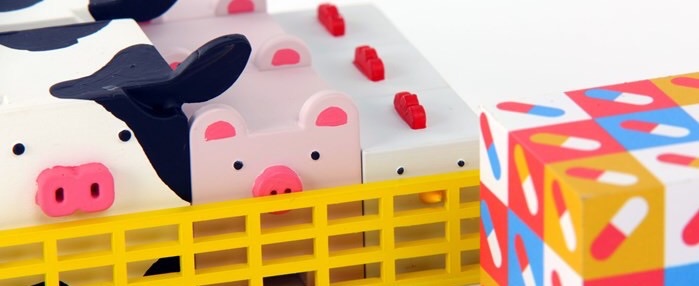
‘Eat less, better quality meat’ is common advice these days. It’s healthier for you, it’s ‘better’ for the animals you eat, it’s fairer for producers, and it’s sustainable for the environment. Simple? Of course not.
“In rich Western nations, preaching about how eating a lot of meat is bad for both one’s health and the planet provokes resentment. Meanwhile, in developing nations, the rising middle-classes can at last afford to eat more meat, which was previously a luxury. It’s not surprising that governments worldwide duck out of tackling the problem.”
The Arguments for Eating Meat
“Meat eaters’ psychology, [Dr Hank] Rothgerber believes, operates via an almost hierarchical set of justifications, from the instinctive justification of want and desire (“I like the taste of meat too much to go without it”), through perceived necessity (“I need meat to be healthy”) to more sophisticated constructions about how the treatment of animals is positively connected to them as consumers (“I only eat free-range, ‘happy’ meat”).” (Elford, J, 2014 Autumn, “The Inner Conflict of Meat Eaters”, The Vegetarian, p40-41)
Meat-free Food is Tasteless
Are you sure it’s the meat you’re tasting? With processed food it’s often salt, sugar, chilli, garlic, mustard – all vegetarian – or artificial flavour enhancers, that provide the strong taste. Intensively rearing animals leads to less flavoursome meat. It’s the same for plants: throw lots of fertiliser at them and they grow fast and tasteless. Yet plants offer many herbs and spices with which to flavour food. You may even find it doesn’t seem so bland once you cut back on the taste explosions.
Humans are Omnivores
Our digestive system is designed by evolution to eat a mixture of plants and animals. Absolutely. However, firstly, our evolution isn’t ‘finished’; it’s an ongoing process of which we’re seeing only a snapshot, which gives us choices for a varied diet, not justification. Secondly, only very recently in our evolutionary history have we eaten intensively farmed meat, and in such high quantities. Our digestion is poorly adapted to eating such a high proportion of low quality meat, and so contributes to many digestive complaints. Lastly, our evolution is also ethical: we recognise sentience in other species, and suffering, and that it is wrong to wilfully inflict such suffering.
Meat-free Food is Unhealthy
It’s quite possible to eat an entirely healthy vegetarian diet. Certainly there’s an easy pitfall of eating too little protein, just as meat eaters have an easy pitfall of eating too much saturated fat. So it must be a conscious diet, which is true of any 21st century diet. Otherwise we end up eating mostly processed foods, high in fat, sugar and salt, with entirely the wrong balance of macronutrients (protein, carbohydrate, fat) and too little of vitamins, minerals and phytochemicals (plant-derived chemicals with key roles in health). In fact, beans, grains, nuts and seeds provide plenty of protein, along with arguably better sources of fat, minerals and other nutrients. The existence of vegetarians is living proof that meat is not necessary (Elford, J, 2014 Autumn, “The Inner Conflict of Meat Eaters”, The Vegetarian, p40-41).
Disconnection
Even the most ‘pure’ package of space-age food pill, targeted to provide exactly what our bodies need with no waste, has to be produced from processing something living. A gigantic sugar cube is not enough; we need more than just calories. And we need to face what we eat. If the idea of battery chickens and abattoirs makes us uncomfortable, perhaps we shouldn’t eat their products. What is going on in our minds if we consume these products while denying our moral values? What are we saying about how we feel about our bodies?
“At the heart of the meat paradox, meat eaters face uncomfortable truths: animals are conscious creatures, animals feel pain, and – though good people don’t harm animals – eating meat inevitably involves hurting them. Social scientists have termed the emotional discomfort that stems from holding simultaneously conflicting thoughts, beliefs and perceptions ‘cognitive dissonance’.” (Elford, J, 2014 Autumn, “The Inner Conflict of Meat Eaters”, The Vegetarian, p40-41)
Why don’t we face such clanging cognitive dissonances? We wrap ourselves in a whirlwind of ‘important’ activities and decisions while the basic features of life are left to autopilot. Perhaps we can be forgiven as we have been so successfully duped into trusting the food industry by the massive marketing machine.
Could you kill a chicken yourself? A fish? A pig? Does it matter to you how it lives and dies? Do you care about the animal? Do you care about yourself? Do you leave those issues to someone else to deal with?
The meat producing industry hides the unpalatable realities behind business language and high walls: intensive rearing means cramped unhealthy conditions, abattoir or slaughterhouse procedures are not discussed, cling-filmed polystyrene trays belie helter-skelter processing lines with marginal hygiene practices. Animals are seen merely as commodities. The damage to the environment and risk to human health from the concentrated waste is not acknowledged.
Most farm animals do not live ‘happy’ lives roaming idyllic countryside. Yet “from the nostalgic toys made by the likes of LEGO and Fisher-Price to the countless smiling farmyard animals seen on screen over the decades, the small-scale, bucolic farm is likely to be the only sort of farm [children] know.”
Once again, capitalism fails to force better standards and quality through open competition. Instead, demand for cheaper prices drives safety omissions, compromised quality and lamentable loss of humanity.

Your Farm toy from Compassion in World Farming
Social Isolation
There are powerful social and cultural contexts to eating, of course. If I present my special dietary needs, I appear to some extent to be excluding myself from sharing, making myself appear untrusting and untrustworthy, and even judging others’ choices. All the intellectual arguments can dissolve in the face of the instinctive ‘gut’ urge to be a social animal (Vegetarian Society, 2013 Winter, “Changing Your Mind”, The Vegetarian, p27-32).
Pigeon-holes
I’m vegetarian. There, I’ve said it. Except I’m not. I sometimes take medication that contains gelatin (which is derived from animal bones after slaughter), I wear leather, but I don’t eat dairy, or use soap made with animal fat. What sort of wishy-washy principles are those?
It’s not whether there are moral absolutes; it’s that we are complicated, changeable beings. I was raised omnivorous, despite apparent vegetarian preferences; seemingly being left-handed was more culturally acceptable than being vegetarian. Or perhaps there are only so many concessions to be made to a fussy child. Now I’m not going to bin perfectly serviceable shoes, adding waste to the existing crime of suffering. Nor am I going to reject medication. There are other ways to skin a tomato. I’m nowhere near ethical nirvana, but challenging myself and acting where I can is better than denial.
Critically, I’m not trying to convert anyone else to my idiosyncratic collection of fussinesses. And I haven’t even mentioned spiritual beliefs or medical conditions. It’s entirely personal.
Ethics: What is Our Motivation and Responsibility?
Personal: is health important to you? Do you want to avoid the infection, disease, toxins that are increasingly part of the meat-eating package? These can cause all sorts of health issues from mild stomach upset to debilitating nervous system deterioration, depending on the poisonous elements and artificial chemicals the meat contains. This is not exclusively a meat issue, but intensive farming and processing is exacerbating these risks.
Animal: how much suffering can you allow on your behalf? Have you any reason to trust big business when it tells you industrial farming is ‘humane’ and even the most sentient of mammals feel no pain? Why do horsemeat scandals and bacterial contamination scares make headlines? Our minds are in conflict. Our rational understanding challenges our behaviour, and that’s deeply uncomfortable.
How about genetic engineering? Pigs that grow double the muscle, thus double the meat – even if that’s not inherently unacceptable to you, but just a means to an end – have much higher mortality rates. “‘Double-muscled’ pigs are made by disrupting, or editing, a single gene … and … the breed could be among the first genetically engineered animals to be approved for human consumption. … The pigs provide many of the double-muscled cow’s benefits — such as leaner meat and a higher yield of meat per animal. However, they also share some of its problems. Birthing difficulties result from the piglets’ large size, for instance. And only 13 of the 32 lived to 8 months old.” Is it acceptable to engineer animals to feel less pain?
Economic: highly carnivorous diets are socially and environmentally unjust. “Until recently, the big business of global agriculture neither recognized nor internalized the social and environmental costs of commodity production. These high costs were borne by displaced indigenous peoples and local communities, and also by the global community through climate change and biodiversity loss. … By any honest accounting, the costs on vulnerable people and the planet have been high and unnecessary.”
Environmental: it takes six to eight kilograms of plant protein to grow a kilogram of meat protein. The use of water and fossil fuels is similarly disproportionate. Plus ‘growing’ meat takes land space that therefore can’t be forest, which further imbalances our carbon budget.
What is ‘Better Quality’?
If the animal you eat has been raised in cramped conditions on marginal food, it suffers. Its body is in less good condition. The meat or other derived products (gelatin, rennet, leather, etc.) are lower quality – fewer nutrients, lower protein proportion, more pathogens and toxins, more pharmaceutical residues, poorer texture. Whatever we use it for, we have to work harder to get what we want from it.
“Beef and lamb raised on more natural pasture-based livestock systems produce a much higher quality product, but they mature more slowly than animals kept indoors and fed grain. This means there is less of it – requiring a fundamental shift in our own thinking about how much and what type of meat we want to eat. We need to think more carefully about the impact its production has on the planet and value it more than a basic commodity item.”
What are the Choices?
Personal: consider how you can eat less meat. Meat-free Mondays, Vegetarian month, whatever works, regardless of the label. “Part-time carnivore is a far more inclusive identity. Whereas flexitarian implies a proximity to vegetarianism, the Part-Time Carnivore pledge allows for up to six meaty days each week (and down to zero). The emphasis is on breaking the habit that most people have of choosing meat automatically for their meal.”
Animal: consider how you can improve the quality of what meat you do eat. Find an independent butcher who can tell you which farm the meat came from.
Economic and Environmental: buy local so your money goes direct to the producer, not packaging and transport.
Some people have fewer choices and most often feel forced into buying low quality food by its cheap price. But there are always choices.
Why Should I Care?
We all care about something. Animal welfare, health and fitness, wildlife, social equality are a few examples. Whatever matters to you, it probably fits into to the food equation: we all have a duty to ensure the food we put into our bodies also fits with our values. Whatever you eat, do it consciously. We have such power to do better for ourselves, for other people and for other life.





Pingback: Eathics: eat better for whatever you believe in | Lifelogy | WORLD ORGANIC NEWS